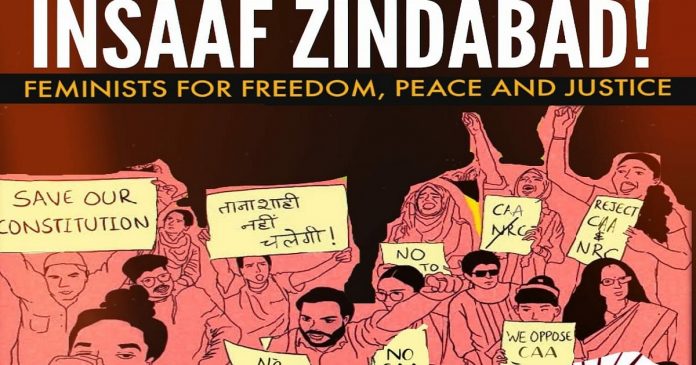TCN News
On the occasion of the 74th Independence Day of India, Insaaf Zindabad – Feminists For Freedom, Peace And Justice (IZ-FFPJ) has issued a statement to mark 100+ days of a strong, peaceful, feminist mass protests in India that had started in late 2019.
IZ-FFPJ is an autonomous initiative of feminists from organizations, alliances and groups across religion, class, caste, ethnicity and sexuality sharing feminist values that identify itself as purely “committed towards equal citizenship and rights for everyone.” The network has eminent names such as Annie Raja, Ayeesha Rai, Poonam Kaushik, Vani Subramanian and several others from across the country endorsing “equity, justice and freedom from all forms of oppression.”
On its Independence Day note, IZ-FFPJ iterated its commitment particularly to women, trans and queer people facing State repression for their participation in the mass movement against CAA-NRC-NPR. It discussed significant instances pointing to the State’s attacks on rights workers. It said that these attacks are further “backed by vicious misinformation campaigns and false narratives” and that the State is bent on silencing dissent to cause a “chilling effect on entire communities who have dared to speak up for democratic rights, constitutional values, equality, diversity, pluralism, justice and peace.” On its 74th year of Independence, in a scenario where “facts are being twisted into false narratives and peacemakers are being blamed for the violence, while the instigators and perpetrators of violence continue to roam free and operate with impunity,” it asked whether the country is really independent. As a feminists’ coalition committed to democratic values, it has asked: “where is the real independence, the real freedom for citizens to think, speak, write, educate, agitate, organize, resist, dissent or question?”
Addressing the recent northeast Delhi violence, IZ-FFPJ has questioned the State’s “brutal crackdown” on activists, students, university professors, lawyers and media personnel. Continuing, IZ-FFPJ stated that Delhi has become the “epicentre of a systematic onslaught of interrogations, arrests and harassment,” where the “worst riots in 40 years” was “targeted primarily against Muslim populations.” The statement described how all of these are actually to silence voices of dissent of “entire communities who have dared to speak up for democratic rights, constitutional values, equality, diversity, pluralism, justice and peace.” The group has noted that protestors who are now stuck in domestic lockdown due to Covid-19 and state lockups “due to slew of fake cases and draconian laws” only give it more reason to organize and speak out for what is right and just. It has, therefore, asserted its democratic right to freedom of speech and expression by expressing their “dissent against the injustices of the legislature, the judiciary and the executive,” simultaneously “resisting the enforcement of this undeclared Emergency on the people.”
IZ-FFPJ also expressed serious concerns among the growing crackdown of women voicing out State attacks. It gave examples of instances among countless others where women have been beaten or assaulted merely for reporting or informing the police. Most recently three women residents, the youngest aged 17 years, were beaten up and sexually assaulted by the police at Bhajanpura Police Station on August 8 when they had filed a complaint regarding communal slurs and slogans by neighbours on the occasion of ‘bhoomi pujan’ ceremony at Ayodhya’s Ram temple. Again on August 11, a journalists’ team was heckled and beaten up by a Hindu mob amid police presence in northeast Delhi compelling them to delete the footage they had shot for a story on communal tensions. It highlighted that the female staffer in the team was “both sexually and physically assaulted by the group.”
Concerning the above, IZ-FPPJ has strongly condemned “the politics of intimidation and lawlessness, enabled by the actions and inactions of the State and its agencies,” demanding a just enquiry into all instances of hate crimes and violence during northeast Delhi riots and thereafter. In the endnote, it resonated that the coalition of feminists who at Insaaf Zindabad “reject the toxic state and patriarchal narratives that seek to deny women’s right to political opinion and action.”
Insaaf Zindabad extended their gratitude to Muslim women stating that they “remain inspired by the masses of people, led by a woman from the Muslim communities, who HAVE struggled to reclaim constitutional rights and values from the jaws of the right-wing.” It said that it is ready to fight the oppressive State along with women on the forefront “as they try to convert a diverse, pluralistic India into a Hindu Rashtra,” and stand in solidarity with “all political prisoners who are being persecuted for exercising their democratic right to dissent draconian laws and decisions of the current regime.”


